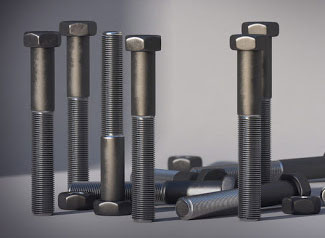Introduction
High-tensile fasteners are specialized bolts, screws, nuts, and studs designed to withstand extreme mechanical stress, heavy loads, and challenging environmental conditions. Unlike standard fasteners, which may fail under high pressure or vibration, high-tensile fasteners are made from premium alloy steel and undergo strict heat treatment and surface coating processes to enhance their strength, durability, and resistance to wear and corrosion. The key feature that sets high-tensile fasteners apart is their strength grading system, commonly classified as 8.8, 10.9, and 12.9, where higher numbers indicate greater tensile and yield strength. These fasteners are essential in industries where structural integrity and long-term reliability are non-negotiable, such as construction, automotive, aerospace, railways, marine, oil and gas, and heavy machinery manufacturing. As industries continue to evolve, the demand for stronger, more durable, and highly resistant fastening solutions is growing. Whether it’s securing high-rise buildings, stabilizing heavy equipment, or ensuring safe vehicle operation, high-tensile fasteners play a critical role in maintaining safety, stability, and efficiency in various engineering applications.
Advantages of High-Tensile Fasteners
- Superior Strength
- High-tensile fasteners are designed to handle extreme loads and forces without deformation or failure.
- They offer higher tensile and yield strength compared to regular fasteners, ensuring that structures remain secure and stable.
- Their robustness makes them ideal for critical load-bearing applications where regular fasteners may shear off under stress.
- High Load-Bearing Capacity
- These fasteners can withstand high static and dynamic loads, making them suitable for applications that involve vibrations, shocks, and continuous pressure.
- They ensure structural integrity in machinery, vehicles, and industrial frameworks, reducing the risk of loose or failed connections.
- Ideal for supporting moving or vibrating parts, such as in engines, turbines, and railway tracks, where constant motion can weaken standard fasteners.
- Corrosion and Wear Resistance
- High-tensile fasteners are often treated with protective coatings like zinc plating, hot-dip galvanizing, black oxide, or phosphate coating, which shield them from corrosion, rust, and chemical exposure.
- This makes them perfect for use in marine, chemical, and outdoor environments, where exposure to moisture and harsh conditions could lead to premature failure.
- In industries like oil and gas, construction, and shipbuilding, corrosion-resistant high-tensile fasteners ensure longevity and reliability.
- Longevity and Durability
- The superior material composition and heat treatment process give these fasteners a longer lifespan compared to standard bolts and screws.
- They are less prone to loosening, wear, or fatigue failure, reducing the need for frequent replacements and lowering maintenance costs.
- This durability ensures long-term performance in demanding applications, such as steel structures, bridges, and high-pressure pipelines.
- Precision Engineering
- High-tensile fasteners are manufactured with strict dimensional tolerances, ensuring a secure and precise fit in assemblies.
- They minimize misalignment, structural stress, and connection failures, making them crucial for aerospace, automotive, and heavy machinery industries.
- Many high-tensile fasteners are tested for strength, fatigue resistance, and load capacity, ensuring consistent performance under extreme conditions.
Common Applications of High-Tensile Fasteners
- Construction and Infrastructure
- Used in bridges, highways, skyscrapers, stadiums, and large-scale steel structures to provide maximum strength and stability.
- Ensures secure connections in load-bearing components, such as steel beams, foundation bolts, and anchor bolts.
- Their resistance to seismic activity, wind forces, and environmental degradation makes them essential in critical infrastructure projects.
- Automotive and Aerospace
- In the automotive industry, high-tensile fasteners are used in engine components, chassis assemblies, suspension systems, and transmissions.
- Their ability to withstand extreme temperatures, vibrations, and road stress ensures vehicle safety and longevity.
- In aerospace applications, they are used in aircraft structures, jet engines, and landing gear, where even a slight failure can lead to catastrophic consequences.
- Heavy Machinery and Industrial Equipment
- Essential for assembling and securing industrial machines, mining equipment, and manufacturing tools that operate under high loads and stress conditions.
- Ensures stable and durable connections in machinery that experiences constant mechanical movement and pressure.
- Used in hydraulic presses, turbines, compressors, and high-power motors, where ordinary fasteners would fail under pressure.
- Railways and Marine Applications
- Provides strong and corrosion-resistant fastening solutions for rail tracks, locomotives, and marine structures.
- Designed to withstand constant vibrations, extreme weather conditions, and saltwater exposure, making them crucial for harbors, docks, and shipbuilding.
- High-tensile bolts are used in railway joints and engine assemblies to enhance safety and operational efficiency.
- Oil and Gas Industry
- Used in pipelines, drilling rigs, refineries, and offshore platforms, where extreme pressure, heat, and chemical exposure are common.
- Ensures safe and leak-proof connections in high-pressure environments.
- Their ability to resist sulfide stress cracking (SSC) and hydrogen embrittlement makes them a reliable choice for hazardous and high-risk operations.
Conclusion
High-tensile fasteners have become a backbone of modern engineering and industrial infrastructure, ensuring safety, stability, and efficiency in a wide range of applications. Their exceptional strength, high load-bearing capacity, and resistance to wear and environmental damage make them indispensable in critical sectors such as construction, automotive, aerospace, marine, and oil and gas. Choosing the right grade, material, and coating for high-tensile fasteners is essential for ensuring longevity, reducing maintenance costs, and improving structural integrity. As technology advances, innovations in material science, coatings, and manufacturing techniques continue to enhance the performance of high-tensile fasteners, making them even more reliable and efficient. With the increasing complexity of industrial applications and growing safety regulations, the demand for high-quality, high-tensile fastening solutions will only continue to rise. Investing in the right fasteners is not just a matter of efficiency but also a crucial factor in ensuring the safety and success of engineering projects worldwide.

